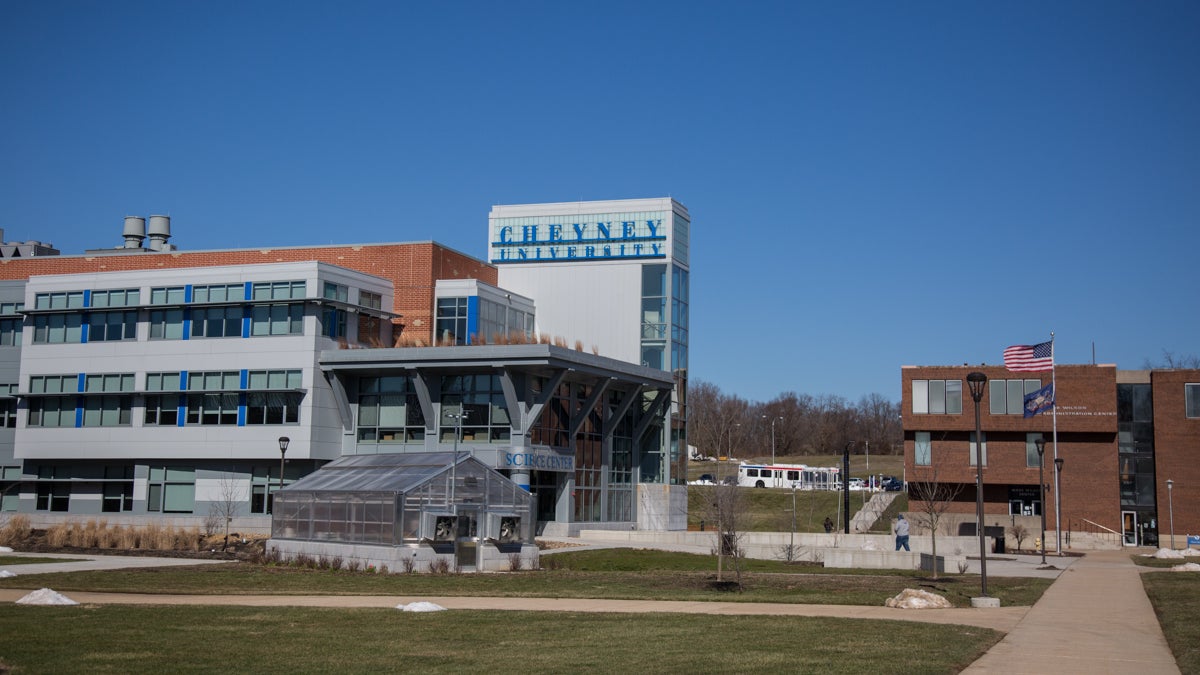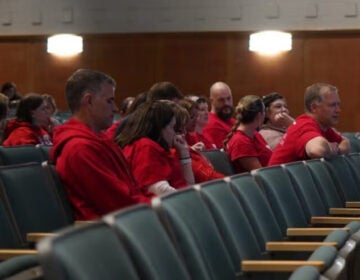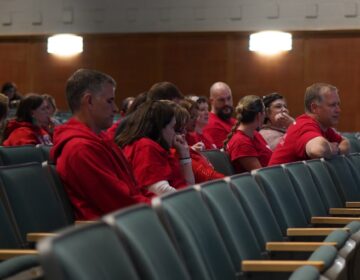Losing students and funds, Cheyney University continues striving for accreditation
The nation’s oldest historically black university is working to fulfill the conditions for certification, but it has options other than closing should it lose accreditation.

Cheyney University of Pennsylvania is a public, co-educational historically black university that is a member of the Pennsylvania State System of Higher Education. (Emily Cohen for WHYY, file)
The oldest historically black university in the nation, Pennsylvania’s Cheyney University, is fighting to remain an accredited school. It will find out its future by the end of the year.
Supporters expect the school to remain open, but what that may look like varies.
Cheyney, which sits on 275 acres in Delaware and Chester counties, has faced a steep enrollment drop of 67 percent since 2007, along with major financial issues for several years.
Middle States Association, the regional accrediting body, will decide in November whether the university will keep its accreditation.
Without accreditation, the state-owned school would be ineligible to receive federal financial aid. Right now, 94 percent of Cheyney’s students receive some type of financial aid that is administered through the school.
Cheyney is one of the 14 universities that make up the Pennsylvania State System of Higher Education.
The state system has seen an overall drop in enrollment, including dipping below 100,000 students for the first time since 2001.
The HBCU is $43 million in debt to the state system, but the system will erase $30 million of that if the school maintains a balanced budget and meets other requirements.
At a state Senate appropriations hearing last week, system Chancellor Daniel Greenstein was asked if Cheyney would close if it were not accredited
That could happen, he acknowledged. But it also could offer non-degree certificate programs or become part of another university.
Marybeth Gasman, an expert on historically black colleges and universities, said a reorganization is vital.
“It’s incredibly important that if you care about Cheyney that you realize that the status quo is not going to work,” she said. “It’s not working. And so you’ve got to do something else.”
Cheyney, for instance, could focus on its existing successful areas, such as its Keystone Honors Academy or its science, technology, engineering and mathematics fields.
“You’ve got to try some new thing, and that might mean that being an honors college affiliated with one of the other institutions. That might mean that you end up focusing only on STEM,” she said. “You do what you do best.”
State system of higher education in Cheyney’s corner
Cheyney has already made some changes. Last year, the school established partnerships with Starbucks and Thomas Jefferson University, as well as creating a research institute as part of a strategic plan.
Kenn Marshall, spokesman for the state system, said no other immediate changes will be considered while the school works to maintain its accreditation.
“We are hopeful that that will happen,” he said. “If it doesn’t and Cheyney were to lose its accreditation, there are other options that are available.”
Among the conditions it must meet for accreditation, the university must raise a projected $4 million by June to maintain a balanced budget.
“We’re going to continue to work with Cheyney in every way we can to support their efforts on behalf of students so that the university can continue either as an accredited institution or in some other form,” Marshall said.
Bennett College in Greensboro, North Carolina, one of two private all-women HBCUs in the country, had its accreditation removed last week, but school officials filed a lawsuit after their appeal was denied. A court order restored Bennett’s accreditation while the lawsuit moves forward.
The women’s college is also applying to be a member of a different accrediting association.
Cheyney could also apply to join other national and programmatic accreditors.
“I’m not prepared to give up on Cheyney,” said Robert Bogle, chair of the school’s council of trustees. “I would hope that no one is prepared to give up. Should you be serious about ‘what if?’ Sure. You have to be reasonable and concerned.”
Bogle, the CEO and publisher of the Philadelphia Tribune, pointed to Cheyney’s legacy of educating young African-American men and women when other institutions would not.
“Cheyney has been dedicated to that proposition for, I believe, 182 years. That’s not a bad record. Cheyney was there when nobody else wanted us,” he said.
In August, the state-owned university will submit a report to the accrediting body, Middle States Association, and a decision will be made on Nov. 21.
Middle States has an appeal process, if Cheyney officials disagree with the ruling.
WHYY is your source for fact-based, in-depth journalism and information. As a nonprofit organization, we rely on financial support from readers like you. Please give today.




